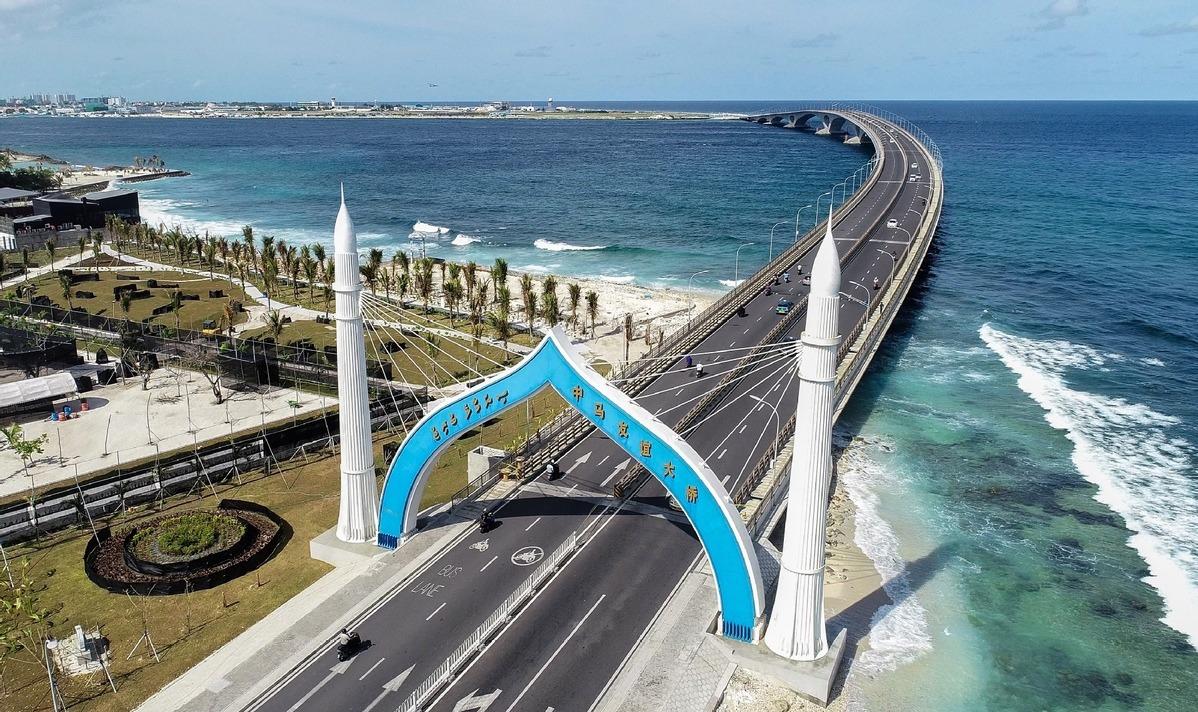 This file aerial photo taken on Sept 1, 2019 shows the China-Maldives Friendship Bridge in Maldives. (PHOTO / XINHUA)
This file aerial photo taken on Sept 1, 2019 shows the China-Maldives Friendship Bridge in Maldives. (PHOTO / XINHUA)
Over the past decade, the China-Maldives partnership has set a good example of equality and mutual benefit between countries regardless of their sizes. Yet that has not stopped some media in the West from continuing to harp on the old tune of China's "debt trap", by claiming that Chinese lending to the country will compromise the Maldives' long-term growth.
Which is not true.
The fact is the current debt repayment obligations of the Maldives are mainly to multilateral financial institutions, not China. As a matter of fact, the Chinese assistance brings tangible benefits to the local people. And China has ensured the arrangements for loan interest rates, repayment periods and grace periods are appropriate.
Over the past 10 years, bilateral relations have deepened and the practical cooperation between the two countries has achieved fruitful outcomes in various fields, especially after the Maldives joined the China-proposed Belt and Road Initiative in 2014.
Belt and Road projects have helped transform the Maldives' economic landscape and significantly improved its people's well-being and livelihood. The China-Maldives Friendship Bridge, which opened in 2018, has made commuting much easier for hundreds of thousands of Maldivians and allowed for expanded economic activities. Chinese assistance has also enabled the construction of social housing units in the country and made the expansion and upgrading of the Velana International Airport possible.
China was already the largest source of foreign tourists to the Maldives in 2019, with Chinese tourists representing about 20 percent of all foreign visitors to the archipelagic nation. The number is expected to increase rapidly and return to pre-pandemic levels this year following the resumption of outward travel from China.
As Maldivian President Mohamed Muizzu said at a forum in Fuzhou, Fujian province, on Tuesday, China has become one of the Maldives' closest developmental partners.
Muizzu is paying a five-day state visit to China, which is expected to push bilateral relations to new heights, as it opens up new opportunities for the two countries to expand their mutually beneficial cooperation in such areas as infrastructure, tourism, modern agriculture and fisheries.
This has prompted those clinging to the Cold War mentality, who choose to look at the closer China-Maldives engagement through the tainted glasses of geopolitical competition, to speculate that China is vying for influence in the region against India, the traditional strategic partner of the Maldives, as it is the first time a Maldivian president has visited China before visiting India.
Nonetheless, such thinking could not be further from the truth. China fully respects the Maldives' right to choose its own development path and partners. It is those making such claims who regard a country as enjoying exclusive rights to exert a certain degree of unwarranted influence over another.


